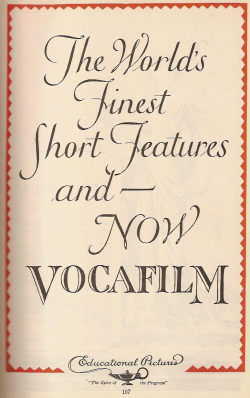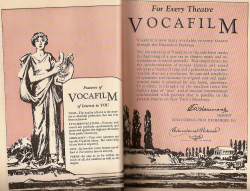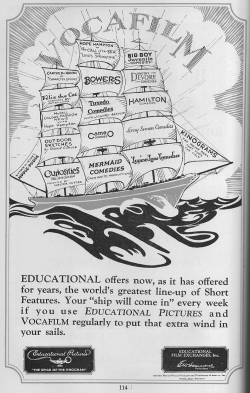Vintage: Vocafilm
Sound film didn't just arrive in the industry as a singular entity, a crystal clear technological gift to the industry. A lot of different companies and research groups devised different means of using sound in the movies, and there was real competition, especially between Warner Bros. with Vitaphone and Fox with Movietone. But there were other systems as well, such as Vocafilm, that were ultimately either bought up or squeezed out.
In 1928, none of the fates of these technologies were quite clear.

It was typical for early use of sound to be more prevalent in shorts than in features. Sound slowed down the the filmmaking process and posed numerous technical challenges. It made sense that filmmakers would experiment with shorts first, before undertaking expensive feature films. Plus, sound technologies would reach a wider audience by making ten sound shorts as opposed to one sound feature. One movie plays to one audience. Ten shorts plays to ten.

Incidentally, I love that "perfect synchronizing" of sound and picture is used as a marketing point. Don LaFontaine should be touting that in modern movie trailers.

Smug Broadwayfarers learned last week that the shoguns of the show world, principally the Brothers Shubert, Albert Herman Woods, William A. Brady, Arthur Hammerstein, had bickered among themselves, had dickered with one David R. Hochreich, president of Vocafilm Corporation of America, makers of a talking picture device that theretofore had been obscured by Movietone (parade music, gunfire) and by Vitaphone (Ben Bernie, tapdancing, Frances Williams). Unofficially, the newspapers said that Hochreich and the theatre shoguns had made a deal: Hochreich to receive money, the producers the rights to his invention.
Many a movie man smiled; it was a moral victory for the motion picture over the stage. The "legits" had been forced to fight the cinema with weapons that the cinemagnates introduced. But no smile twisted the cheeks of the more astute picturemen. To these wiser ones the action of the stagemen seemed a threat. The Brothers Shubert alone own, control or have easy access to more than 30 theatres in the provinces. Less powerful individually but dangerous en masse are Hammerstein, Brady, Woods, lesser lights. The Vocafilm reputedly costs less to install than does Movietone, Vitaphone. Further, cinemagnates recalled that the popularity of "talkies," particularly Vitaphone, was due largely to ability to present to audiences in Pottsville, Pa., or Missoula, Mont., stage stars who otherwise would not be heard and seen in such towns. A report that the autumn hits will be Voca-filmed, distributed among controlled theatres near and far, to run contemporaneously with the successful pieces, was not denied.
Of salaries to be paid legitimate actors, nothing was printed. Rumor said performers would be paid flat sums for Vocafilm recording as now is done by Vitaphone, Movietone. Satisfactory terms, sufficient to prevent the stage stars being lured to the movies, surely would be arranged. Few artists, no hams, can wage private salary war against a Shubert-Hammerstein-Brady-Woods combination.
|


